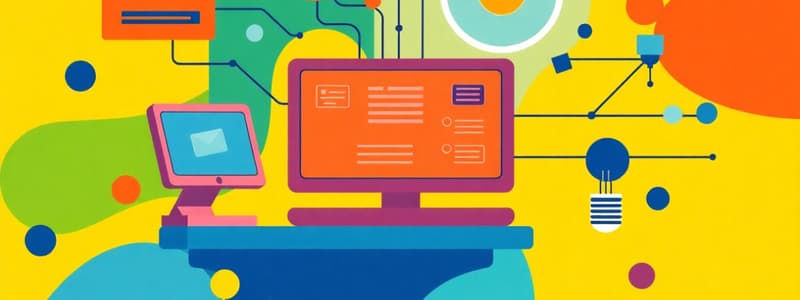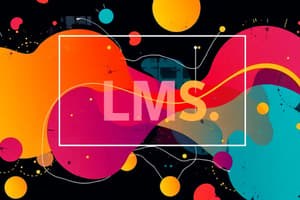Podcast
Questions and Answers
What primary skill does the Practical Algebra Tutor (PAT) aim to improve?
What primary skill does the Practical Algebra Tutor (PAT) aim to improve?
- Algebra skills (correct)
- Statistics skills
- Geometry skills
- Calculus skills
Which feature of PAT allows it to provide tailored feedback to students?
Which feature of PAT allows it to provide tailored feedback to students?
- Multimedia presentations
- Knowledge tracing (correct)
- Real-world application
- Psychological modeling
PAT utilizes a Bayesian model. What does this model estimate?
PAT utilizes a Bayesian model. What does this model estimate?
- The cost-effectiveness of problems
- Student mastery of specific skills (correct)
- Classroom engagement levels
- Student retention rates
What is one way PAT addresses student misconceptions?
What is one way PAT addresses student misconceptions?
Which demographic shows a benefit from using the CognitiveTutor® curricula?
Which demographic shows a benefit from using the CognitiveTutor® curricula?
What kind of problems does PAT use to engage students?
What kind of problems does PAT use to engage students?
The intelligent tutoring device developed by the Concord Consortium focuses on which subject area?
The intelligent tutoring device developed by the Concord Consortium focuses on which subject area?
What learning method does the Concord Consortium's system employ to introduce new concepts?
What learning method does the Concord Consortium's system employ to introduce new concepts?
What is one primary function of Learning Management Systems (LMS)?
What is one primary function of Learning Management Systems (LMS)?
Which of the following is NOT typically a feature of Learning Management Systems?
Which of the following is NOT typically a feature of Learning Management Systems?
What limitation of computer use in education was identified by teachers in the late 1980s?
What limitation of computer use in education was identified by teachers in the late 1980s?
How have advancements in cognitive science influenced educational technology?
How have advancements in cognitive science influenced educational technology?
What does the term 'neuroplasticity' refer to in the context of education?
What does the term 'neuroplasticity' refer to in the context of education?
Which of the following tools is specifically mentioned as part of Learning Management Systems?
Which of the following tools is specifically mentioned as part of Learning Management Systems?
What challenge do educators face in utilizing findings from cognitive science?
What challenge do educators face in utilizing findings from cognitive science?
What is one of the most popular Learning Management Systems mentioned?
What is one of the most popular Learning Management Systems mentioned?
What primary concern did teachers express regarding the available instructional software in the 1980s?
What primary concern did teachers express regarding the available instructional software in the 1980s?
What was a major barrier to the effective use of computers in classrooms as identified by teachers?
What was a major barrier to the effective use of computers in classrooms as identified by teachers?
Which type of software did teachers in elementary schools primarily use computers for during the 1980s?
Which type of software did teachers in elementary schools primarily use computers for during the 1980s?
How much time did a typical student use a computer per week in the late 1980s?
How much time did a typical student use a computer per week in the late 1980s?
What was a common characteristic of teachers' involvement in the development of instructional software during the 1980s?
What was a common characteristic of teachers' involvement in the development of instructional software during the 1980s?
What did researchers focus on instead of detailing the benefits of using computers in schools by the end of the 1980s?
What did researchers focus on instead of detailing the benefits of using computers in schools by the end of the 1980s?
Which of the following reasons did teachers give for low usage of computers in the late 1980s?
Which of the following reasons did teachers give for low usage of computers in the late 1980s?
What did the introduction of color monitors and graphical user interfaces in the 1990s help improve?
What did the introduction of color monitors and graphical user interfaces in the 1990s help improve?
Flashcards are hidden until you start studying
Study Notes
Learning Management Systems
- Learning Management Systems (LMS), also known as Instructional Management Systems, are online tools used for real-time collaboration and communication between administrators, teachers, and students across geographical locations.
- Popular LMS platforms include Blackboard Learning System, Share-Point LMS, ANGEL Learning Management Suite, Sakai, and Moodle.
- LMS integrate online course management, communication, and collaboration tools like forums, file sharing, email, journals/blogs, chat, interactive whiteboards, bookmarks, calendars, search tools, group work, electronic portfolios, registration, hosted services, quizzes/surveys, marking tools/gradebooks, student tracking, content sharing, and object repositories.
Intelligent Tutoring
- Intelligent tutoring systems emerged from advancements in cognitive science and education.
- These systems apply principles of programmed instruction and brain function to improve learning.
- The Practical Algebra Tutor (PAT) is a computer-based tool developed by Carnegie Mellon University that aims to enhance algebra skills.
- PAT uses real-world problems and allows students to utilize various tools for problem-solving.
- It features a psychological model of cognitive processes to track student progress and identify misconceptions.
- The tool uses model tracing to track student progress within a problem and knowledge tracing to track progress across multiple problems.
- PAT utilizes a Bayesian model to estimate student proficiency and identify strengths and weaknesses, informing the selection of subsequent problems and pacing.
- PAT was piloted in 1993 and has since expanded to include a series of products used nationwide, covering algebra, geometry, and quantitative literacy.
- Research suggests that diverse student populations benefit from the use of these cognitive tutor curricula.
- The Concord Consortium is developing an intelligent tutoring system focused on genetics and scientific reasoning skills.
- This system uses guided exploration of genetic traits within a fictitious dragon species to introduce and teach genetics concepts.
Obstacles to Computer Use in the 1980s
- In the late 1980s, evidence of the effectiveness of using computers in schools was lacking.
- Instead, researchers highlighted obstacles to computer use in classrooms:
- Teachers felt excluded from the development of instructional software.
- Commercially available software often didn't meet teachers' needs.
- Software frequently lacked engagement for students.
- Drill and Practice format was seen as an ineffective use of student time.
- Teachers lacked the time and expertise to develop their own materials.
- Technical problems further hindered computer integration.
- Average computer use for students in the late 1980s was estimated at less than 30 minutes per week.
The Emergence of Computer Use in Schools
- Schools began recognizing the value of supporting teachers in integrating computers into their curriculum.
- These advances reignited interest in instructional computer use.
- The number of computers in schools increased significantly between 1980 and 1988, with a surge in corporate donations to gain a foothold in the market.
- Computer use in elementary schools was typically centered on repetitive content drills.
- High schools generally used computers to teach computer skills.
The 1990s: Breakthroughs in Computer Use
- The 1990s brought new ideas and advancements in computer use in classrooms.
- Color monitors and graphical user interfaces led to the development of more interactive and engaging content-based software.
- Simulations, intelligent tutors, and cognitive-based learning tools began to demonstrate potential for improving learning outcomes.
Studying That Suits You
Use AI to generate personalized quizzes and flashcards to suit your learning preferences.




